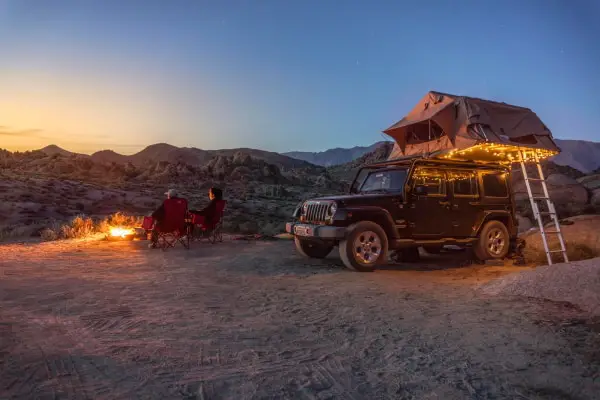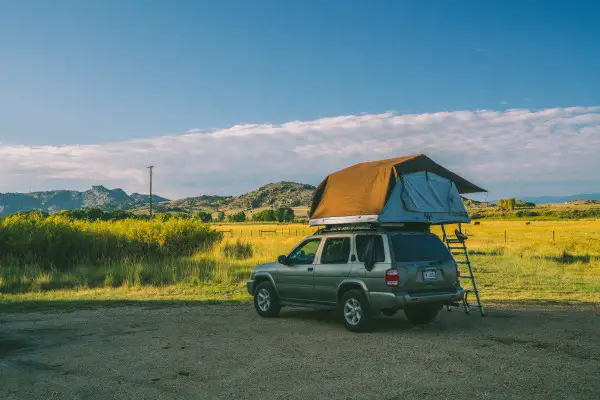
Pictures taken from inside and outside of rooftop tents look awesome on Instagram. They also look like great camping tents to buy, that is until you see how much money they cost.
But are rooftop tents worth it? Just because they’re expensive doesn’t mean they aren’t worth buying. Of course, just because they look cool on Instagram doesn’t mean they are.
In this post, I’ll go over the pros and cons of rooftop tents so you can decide for yourself.
Table of Contents
The Advantages of Rooftop Tents
Easier Setup
Tired of having to dig water trenches around your tent? Sick of having to pound tent stakes into the ground? Rooftop tents eliminate these two arduous campsite tasks.
On top of this, you don’t have to put guy lines out. This means you don’t have to worry about tripping over them after it gets dark each night.
Most modern rooftop tents can be opened up in a matter of minutes. And once opened, you already have your mattress and possibly even your bedding set up inside.
Less Likely to Be Damaged
A traditional ground tent is much more likely to suffer from rips and tears compared to a rooftop tent. This is especially true if you’re prone to set your camp up just before dark.
The reason for this is that a ground tent is often placed over sticks, rocks, and other sharp objects. Yes, it’s always a great idea to smooth out the campsite before setting your tent up, but it’s easy to overlook some of the small objects that love to poke holes in our tents.
Rooftop tents are never exposed to the ground. Not only this, but they are always on the same solid base so they aren’t likely to be torn or ripped during everyday use.
Higher Off The Ground
Being higher off the ground gives you a much better view of the surrounding areas. This is what makes photos taken from the insides of rooftop tents looking out so much better than pictures taken from the inside of ground-based tents.
Also, because you’re up off of the ground, you don’t have to worry as much about bugs trying to crawl in and out of your tent with you each time you open your tent’s doors. You also don’t have to worry about an animal accidentally running through your tent either.
More Storage Space
Putting your tent on the rooftop of your vehicle increases the amount of gear you can carry with you. The space that it would have taken up inside of your trunk is now open for other gear.
With smaller vehicles, this could make a huge difference. I know I’ve left my snowshoes behind figuring it might not even snow only to later regret not having them when the snow ended up coming down in droves. If I would have had more room in my vehicle that day, I’m sure I would have taken them with me.

More Places to Sleep
You might think that having your tent on top of your vehicle reduces the number of places you can tent camp. On the one hand, this is true. You’ll be limited to using your rooftop tent only in areas where you can park. However, if you want to camp in the backcountry, you can always bring a different tent along with you.
On the flip side, you’ll have a tough time using your traditional ground tent in many areas where you could easily use your rooftop tent. For example, a rooftop tent can easily be set up in a parking lot while a ground tent can’t. Also, sometimes you just can’t get your stakes into the ground in some areas. With a rooftop tent, you don’t have this issue.
Safety
A rooftop tent isn’t going to keep a hungry bear or mountain lion out. Anybody who thinks so must have never seen how easy it is for these animals to climb trees.
However, a rooftop tent will keep you safe from being run over. Unfortunately, this has happened at festivals and even at some private and public campgrounds. On New Year’s Day, a 24-year-old man was run over while sleeping in his tent at the Falls Festival in Victoria.
If this man had been on top of his vehicle, the driver would have most likely seen the vehicle and turned away from it. Even if he had hit the vehicle, at least the man would have been well above the driver’s tires. Luckily, the 24-year old lived but his story should be a reminder to all of us to be especially careful where we set our tents up.
Smaller Footprint
The campsites at state and national parks are only so big. Unfortunately, our tents can often take up much of the campsite. With a rooftop tent, we don’t have to worry about this problem.
We can sleep in the parking space behind the campsite and we can use the campsite for anything else we might want to put down. I’ve seen some people bring large screen rooms, hygiene tents, and many other large items that wouldn’t have fit on their campsite if they had their tent set up on the ground.
Less Cleaning
A rooftop tent doesn’t get put on the ground each and every time you use it. This keeps it out of the dirt and mud. As a result, you don’t have to clean your rooftop tent nearly as often as you’d have to clean a ground tent.
In fact, unless some birds happen to foul up the outside of your tent, you may not have to worry about washing your tent at all after your trip.
The Disadvantages of Rooftop Tents
The Cost
Rooftop tents can be expensive. While they’ve recently come down a lot in price, you’re still likely to spend 10 to 15 times more for a rooftop tent than you would a ground tent.
You’ll also need to have a roof rack on top of your vehicle or you’ll need to spend money on that as well. Adding a roof rack to a vehicle that doesn’t have one can easily cost hundreds of dollars.
For this price, you could buy a whole lot of other camping gear to have fun with. In fact, if you don’t go camping very often, you could just rent a cabin within the state park and you’d be even more comfortable and you’d save money too.
Your Base Camp Becomes Tied to Your Vehicle
One thing I like about tent camping over rooftop tents and even motorhomes is that I can drive away from my basecamp without having to take everything down each time. With a rooftop tent as your basecamp, you’ll have to put the tent down before you drive anywhere.
This isn’t the hardest thing in the world to do, but it can be inconvenient. This is especially true if the person your camping with wants to sleep in or vice versa.

Vehicle Gas Mileage
Placing anything on top of your vehicle will reduce your vehicle’s gas mileage. In fact, Buick and Men’s Health did some wind tunnel testing and found that placing a rooftop carrier on the top of their vehicles could drop the gas mileage by 19% to 28% depending on its size.
These tents are also heavier than regular tents so you’ll lose some additional miles per gallon due to the additional weight. You won’t have to suffer these ongoing expenses with a traditional camping tent.
Wind Susceptibility
Placing your tent on top of your vehicle increases the amount of wind it will get hit with. This can make it especially dangerous when camping in high winds. In fact, some tent companies will have warnings against setting these tents up in certain conditions.
Harder to Dry Out
When I come home from a particularly rainy camping trip, I take my tent and I set it up in my garage. Once the tent is open it has the chance to dry out inside. When I lived in an apartment I set my smaller tents up in my kitchen to dry out.
With a rooftop tent, you can’t do this. Even if you have a garage, it most likely won’t be tall enough for you to open up your rooftop tent inside of it. This means that your wet tent is going to stay wet until it’s sunny again. As such, you run the risk of having a tent filled with mildew the next time you go to use it.
Difficult to Clean
Although your rooftop tent won’t get dirty as often, when it does it’ll be more difficult to clean. The reason for this is that the tent is up high and you’ll need a ladder to do any scrubbing the tent may need.
This leads me to my next and last disadvantage of camping with a rooftop tent.
Tougher to Get In And Out Of
A rooftop tent is tougher to get in and out of. In fact, it reminds me of having to sleep in a loft bed one year for college. At first, it seemed great because it gave me a lot of additional storage. However, once I spent a few drunken nights having to climb in and out of it, the luster quickly wore off.
Final Thoughts
Before buying a rooftop tent, it’s wise to consider whether or not the advantages are worth the disadvantages that rooftop tents have to offer. If so, go ahead and buy one.


